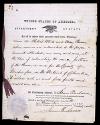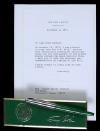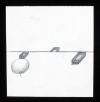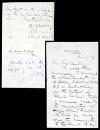The Manuscript, Memorabilia & Collectibles Auction
Featuring personal belongings of Dodger Great Junior Gilliam
December 1, 2001
(If you have a problem viewing enlarged photos, your browser may be blocking pop-up windows. Check with your IT consultant.)
Autographs
U.S. Presidents & First Ladies
Lot 244


Adams, John (1735-1826)
1735-1826, 2d president of the U.S. (1797-1801) As a moderate but forceful
leader of the group who opposed British measures leading to the American
Revolution, he served in both Continental Congresses and argued eloquently for
the Declaration of Independence, which he signed. He became Pres. Washington's
vice president (1789-97) and in 1797 succeeded him as president. Adams's
administration revealed his honest and stubborn integrity. Although allied with
Alexander Hamilton and the conservative, property-respecting Federalists, he
was not dominated by them in their struggle with the Jeffersonians. By
conciliation he prevented war with France. He did not wholly support the Alien
and Sedition Acts. After 1801 he lived in retirement in Quincy. His wife,
Abigail (Smith) Adams, 1744-1818, born Weymouth, Mass., was the chief figure in
the social life of her husband's administration. Lively and intelligent, she
was one of the most distinguished and influential of American first ladies.
Letter Signed ("John Adams"). One page, quarto, Quincy, August
24, 1817. To Commodore William Bainbridge. Also signed by Thomas Boylston Adams
(John Adams' son) and four Quincy neighbors. Transmittal folds, minor foxing,
strengthening tape to verso right edge. Very good condition.
Adams and
his neighbors write to the Commodore on behalf Rufus Davis, "...a labouring
man, and one of our neighbors. He get his living chiefly by the aid of his
boat. He is poor. And his boat is the principal part of his property..." Davis'
small boat had been rammed by one of the Independence's (Bainbridge's
ship) boats which "staved her to pieces." Davis asked his noteworthy neighbors
to write to the Commodore for an investigation and compensation. ".We have
complied, under the assurance from our knowledge of your character, that you
will make an inquiry into the circumstances of the case and cause such justice
to be done him as in your opinion they demand..." Retired to Quincy, Adams
remained active in many aspects of local and national life, and it would be
logical for a neighbor to turn to the grand old man of the neighborhood for
help.
Estimated Value $6,000-7,000.
Lot 245


Adams, John. Free
Franked quarto address leaf ("J Adams"). Addressed to "His Excellency
William Plumer / Epping New Hampshire" in another hand. "Quincy MS, June 16th
Free" in yet another hand at top edge. Transmittal folds, strengthening tape to
right and bottom edges. Fine. The hand reveals Adams was quite elderly when he
franked this page.
Estimated Value $1,700-1,900.
Lot 246


Arthur, Chester A
(1830-1886) 21st president of the U.S. (1881-85). Succeeding to the
presidency after Garfield's assassination, Arthur had an honest, efficient, and
dignified administration. He supported the civil service reform act of 1883 and
vetoed a Chinese exclusion bill that violated a treaty with China.
Document Signed ("Chester A Arthur"). As President. Partially
printed, accomplished in manuscript. One page, 15¾ x 19¼",
Washington D.C., January 13, 1884. Countersigned by Secretary of War Robert
Lincoln. Being an Army appointment to John J. Coppinger. On vellum. Wafer seal
intact and affixed at upper left. Recorder's signature at upper left corner.
One vertical and five horizontal folds. In fine to very fine
condition.
Captain, Colonel, Major, and now, with Chester Arthur's bold
signature, our soldier, John Coppinger is named Lieutenant Colonel of the
Eighteenth Regiment of the Infantry.
Estimated Value $300-400.
Lot 247


Buchanan, James
(1791-1868) 15th president of the U.S. (1857-61); A congressman (1821-31)
and senator (1834-45) from Pennsylvania. At first a Federalist, he became a
conservative Democrat and was Pres. Polk's Secretary of State (1845-49) during
the Mexican War. Under Pres. Pierce, he was (1853-56) minister to Great Britain
and helped draft the Ostend Manifesto. In 1856 he was elected president.
Believing slavery was morally wrong but not unconstitutional, he tried to keep
the "sacred balance" between proslavery and antislavery factions, but his views
alienated radicals in both North and South.
Document Signed ("James
Buchanan"). As Secretary of State. Three pages, quarto, Washington DC,
December 9, 1847. Being a certification of the official capacity of two
justices of the peace named in the included pages. Appropriate seals and
stamps, bound with faded blue ribbon, docketed on verso. Foxing and minor
toning, two horizontal folds. Good to very good condition.
Buchanan was
a very active civil servant, with over 40 years in public service as a state
assemblyman, congressman, ambassador and Secretary of State.
Estimated
Value $600-700.
Lot 248


Bush, George. Signed
Photo ("George Bush"). Color, 11 x 8", n.p., n.d. Bush sits with Nixon
in the White House. Bush signs in a light field above his head. Fine.
A
very nice piece for the Republican in your life.
Estimated Value $200-300.
CIA Chief Bush
Lot 249
Bush, George (b. 1924)
41st president of the U.S. (1989-93). In 1966 he was elected to the first of
two terms as a Republican representative from Texas. He was ambassador to the
UN (1971-73), chairman of the Republican National Committee (1973-74), chief of
the U.S. liaison office in China (1974-75), and director of the CIA (1976-77).
After losing the 1980 Republican presidential nomination to Ronald Reagan, Bush
served as his vice president (1981-89). Elected President 1988. Faced with
escalating budget deficits, he abandoned his electoral pledge of "no new taxes"
and accepted a tax package that was designed to reduce the deficit but largely
failed to do so as recession and an anemic recovery combined to produce the
lowest growth rate since the Great Depression. In 1992 he was defeated in his
bid for reelection by Democrat Bill Clinton.
Typed Letter Signed
("George"). One page, quarto, Washington DC, December 13, 1976. On
embossed George Bush stationery. To Bruce Robertson-Dick. Transmittal envelope
included. Mailing folds, some soiling and toning to edges. Very good.
A
casual note to a Maine harbor master with an interesting mention of Bush's
then-current position "...of all the jobs I have had, none has been more
challenging or more rewarding than being head of the CIA."
Estimated Value
$100-150.
Lot 250


Bush, George W
(b.1946). Forty-third President of the United States. After receiving his
undergraduate degree from Yale University, Bush furthered his education by
gaining his MBA at Harvard. Continuing to follow in his father's footsteps,
George then served in the Texas Air National Guard. Naturally, in 1988 Bush
worked on his father's Presidential campaign and subsequently entered politics
formally, serving two consecutive terms as Governor of Texas, beginning in
1994.
Autograph Note Signed ("George"). One page, recto and
verso, 6¼ x 4¾", n.p., January 1, 1995. On a "Governor-Elect George
W. Bush" notecard. To Ronald Wade. Transmittal envelope included. Fine.
Ron Wade has been a friend to many Republican presidents, is a close
friend of George W. Bush and was appointed by Bush to his Presidential
Inaugural Committee. This letter illustrates their friendship: "Thanks for
your letter -- Thanks for your friendship -- We may need your advice -- I'll
pass your letter on to our folks."
Estimated Value $500-600.
Lot 251


Carter, James Earl (b.
1924) 39th president of the U.S. (1977-81). After a spectacularly successful
campaign for the 1976 Democratic presidential nomination, Carter, although a
Southerner and political outsider, narrowly defeated the Republican candidate,
Pres. Gerald Ford; his running mate was Walter Mondale. Carter's presidency was
plagued by difficult relations with Congress, which ratified his two Panama
Canal treaties (1977) giving eventual control of the canal to Panama, but would
not ratify his arms limitation treaty with the Soviet Union (1979). He was
successful, however, in effecting (1979) a peace treaty between Egypt and
Israel. During Carter's term of office the U.S. suffered high interest rates,
inflation, and then recession, all of which he had little success in
controlling. In Nov. 1979 a group of Muslim militants in Teheran, Iran, took
some 50 U.S. citizens hostage and held them until Jan. 1981. Carter's failure
to attain their release before the 1980 presidential election contributed to
his defeat by Ronald Reagan. Since leaving office, Carter has been active in
human rights issues, often serving internationally as an observer during
first-time free elections, and has worked as an international mediator in North
Korea, Haiti, Bosnia, and elsewhere. He has also worked with Habitat for
Humanity, an organization that helps working-class people build and finance new
homes.
Typed Letter Signed ("Jimmy") with Presidential Pen used
to sign H.R. 5419. One page, quarto, Washington DC, November 1, 1979. On White
House Stationery. To Lady Bird Johnson. Some mat burns on letter, signature is
faded but not illegible, otherwise very good condition.
A great
political connection. H.R. 5419 authorized additional money for the Lyndon
Baines Johnson National Historic Site and the presentation of the signing pen
is a nice a symbol of Carter's great respect for Mrs. Johnson.
Estimated
Value $850-950.
Ex. Ruddy Collection.
Lot 252


Cleveland, Frances Folsom
(1864-1947) Married to Grover Cleveland at 21, in the White House. Known
for her beauty, grace and charm she was one of the most popular First Ladies of
the 19th century.
Autograph Letter Signed ("Frances Folsom
Cleveland"). As First Lady. Three pages, recto and verso, octavo,
Washington DC or New York, August 14, 1886. On "Executive Mansion /
Washington" stationery. To Mr. Wm. C. Wilkinson. Lot includes transmittal
envelope. One horizontal fold, very minor surface soil on one page.
Fine.
Only two months into her marriage, Mrs. Cleveland pens a note of
thanks for a book of poems. "...I shall take pains to do as you wish about
the Ode to Webster -- and I feel sure the President will enjoy it very
much..." and she includes information about summer plans to visit the
Adirondacks.
Estimated Value $125-150.
Lot 253


Cleveland, Grover
(1837-1908) 22nd (1885-89) and 24th (1893-97) president of the U.S. An
enemy of machine politics, he was named the Democratic "clean government"
candidate to oppose James G. Blaine in 1884, and was elected after a bitter
campaign. As president he pursued his conscientious, independent course,
offending the zealots of his party by his moderate use of the Spoils System. In
the 1888 election, Cleveland campaigned on a lower tariff, but in spite of a
popular majority he lost the election to Benjamin Harrison. The panic of 1893
struck a hard blow at his second administration, and he angered radical
Democrats by securing repeal of the Sherman Silver Purchase Act. The party rift
widened when he refused to sign his tariff measure as altered by the
protectionist Sen. A.P. Gorman. In the Pullman strike (1894), he sent in troops
and broke the strike on grounds that the movement of the U.S. mail was being
halted.
Autograph Letter Signed ("Grover Cleveland"). Three
pages, octavo, New York, March 18,1890. To A.S. Habell, Jr, of the Baltimore
Sun. Transmittal envelope (in Cleveland's hand) included, as is an unsigned
cabinet photo of Cleveland, taken by CM Bell. Transmittal folds, adhesive from
early repairs has darkened somewhat at folds, one area of discoloration on
verso of last page, minor surface soil to all three pieces, pencil notations on
the transmittal envelope. Very good condition.
Great content, as
Cleveland may be a slipping a hint that he was prepared to run again for the
Presidency (which he would do successfully, two years later), "Your letter
proposing that I write something for the farmers for publication in the weekly
Sun is at hand. After reflection I am of the opinion that such a course would
not be for the best. It is not unlikely that I may in another way before long
have something to say for their benefit. I wish the articles published in the
Sun could be brought to the attention of the farmers in the West from which
quarter I am daily (almost) in the receipt of applications for this type of
matter. I am quite sure something is going on among them in the way of serious
thinking...I am sure no one can fail to appreciate the splendid work the Sun
(The Baltimore Sun) is doing."
Estimated Value
$850-1,050.
Lot 254


Cleveland, Grover.
Signature ("Grover Cleveland"). As President. One page, 4¼ x
2½", Washington DC, n.d. Black ink on an "Executive Mansion /
Washington" card. Minor soil to edges, otherwise fine.
Estimated Value
$150-200.
Lot 255


Coolidge, Calvin
(1872-1933) 30th president of the U.S. (1923-1929). Vice president
(1921-23) before becoming president upon the death of Warren G. Harding.
Coolidge's New England simplicity and personal honesty were appealing. His
faith in laissez-faire business, economy in government, and tax cuts, and his
opposition to agricultural price fixing all reflected the national mood.
Through his public statements he encouraged the stock market speculation of the
late 1920s and left the nation unprepared for the economic collapse that
followed. He chose not to run again in 1928.
Check Signed ("Calvin
Coolidge"). As President. Partially printed, accomplished in manuscript.
Washington DC, February 23, 1929. The check is drawn on Coolidge's account at
The Commercial National Bank and made payable to Thomas W. White, Collector, in
the amount of $354.29. Punch cancelling, stamped verso. Some ink from verso
visible at the top and bottom of the check, but text and signature are not
affected. Fine.
Eight days before leaving the White House to Hoover,
Coolidge pays his taxes.
Estimated Value $600-650.
Lot 256


Coolidge, Calvin.
Signature ("Calvin Coolidge"). One page, duodecimo, Washington D.C.,
n.d. In blue ink, signed "White House / Washington" card. Very minor abrasions
to bottom corners, faint adhesive residue on verso. Very good to fine
condition.
Estimated Value $100-150.
Lot 257
Coolidge, Grace
(1879-1957) A dedicated educator, she believed First Ladies had an
obligation to address social issues of the day and worked tirelessly for child
welfare.
Signature ("Grace Coolidge"). As First Lady. One page,
4¾ x 2¾", Washington DC, 1927. On "The White House / Washington"
card in black ink. Includes transmittal envelope. One minor abrasion to bottom
right corner. Very good to fine condition.
Estimated Value $50-75.
Lot 258


Eisenhower, Dwight D.
Presidential Pen used to sign S. 497, the Washoe Reclamation Project Bill.
With a letter from Gerald Morgan, Special Counsel to the President to Nevada
Senator George W. Malone indicating the origin of the pen (Malone was from
Washoe County). The letter shows some mat burns and adhesive residue on verso
shows through somewhat. Overall, very good to fine.
Estimated Value
$1,500-2,000.
Ex. Ruddy Collection.
Lot 259


Eisenhower, Dwight D
(1890-1969) American general and 34th president of the U.S. (1953-61). A
West Point graduate, he had a meteoric rise as a military commander during
World War II. Eisenhower coordinated and directed the Allied invasion of Europe
in June 1944. In Dec. 1944 he was made general of the army (five-star general)
and upon his return to the U.S. became army chief of staff (1945-48). After
organizing the defense forces of the North Atlantic Treaty Organization (NATO),
Eisenhower resigned (1952) from the army to campaign for the Republican
presidential nomination. Popularity as a World War II hero brought him an easy
election victory over his Democratic opponent, Adlai E. Stevenson. One of
Eisenhower's first moves as president (July 1953) was to fulfill a campaign
promise to end the Korean War. In domestic affairs, Eisenhower remained aloof
from the legislative process and took few initiatives. Despite a heart attack
he easily won reelection in 1956. His administration then took a more active
role in the growing Civil ights movement. In 1957 he sent federal troops to
Little Rock, Ark., to enforce a court-ordered school desegregation decision,
and later Congress enacted federal civil-rights legislation. Also in 1957, the
president promulgated the so-called Eisenhower doctrine, which committed the
U.S. to an active role in the Middle East to protect the region from Communist
aggression. Tensions with the Soviet Union increased, however, and a summit
meeting (1960) with Nikita Khrushchev ended abruptly because of conflict over
U.S. espionage flights over the USSR. In 1959 the coming to power of the
Communist Fidel Castro in Cuba posed other problems, and Eisenhower broke
diplomatic relations with Cuba just before leaving office in Jan. 1961.
Original unsigned pencil sketch (as President) on an off-white
5½ x 5½" perforated page. Pencil date of April 14, 1959. Folds,
incidental surface soil, else fine.
Accompanied by a photocopied letter
of provenance which reads, in part: "Howard Barney McCray came into possession
of approximately 38 'doodles' done by President Dwight Eisenhower while he was
in the White House. Howard acquired the doodles from his grandfather, the
Honorable Jack Z. Anderson....the president would 'doodle,' sometimes on the
agenda, sometimes on...paper during the discussions...Mr. Anderson...would
retrieve the doodles over a period of several months...It is my understanding
that this is documented at the Eisenhower Museum in Abilene Kansas. It is my
further understanding that the Eisenhower Museum has photostats of the
doodles..."
Estimated Value $250-300.
Lot 260
Ford, Gerald R. Typed
Letter Signed ("Jerry Ford"). As Congressman. One page, octavo, on House
of Representatives letterhead, Washington DC, July 19, 1971. Includes
transmittal envelope. Signature is penned boldly in blue ink, though slightly
smudged. In fine condition.
In full: "Dear Mr. Haskins: / Thank you
so much for your lovely birthday letter. I am deeply grateful for your kind and
thoughtful greeting and good wishes. / Warmest personal regards. /
Sincerely".
Estimated Value $100-150.
Lot 261
Ford, Gerald R. Typed
Letter Signed ("Jerry Ford"). As Congressman. One page, quarto, on
"Congress of the United States / Office of the Minority Leader / House of
Representatives" letterhead, Washington DC, July 7, 1972. To Mr. J.L. Pruett of
Clute, Texas. In very good condition.
In full: "Dear Mr. Pruett, /
replying to your recent letter, I am pleased to send you the enclosed
autographed postcard, family pictures and a copy of my biographical sketch. I
am also enclosing a few issues of my newsletter in which I discuss legislation
debated in [white out] the House of Representatives. / I hope you find this
material helpful in your talks to your students and I am glad to be of service.
/ Warmest personal regards. / Sincerely, Jerry Ford".
Estimated Value
$100-200.
Ex Superior Collectibles Sale, November 15, 16, 1997.
Lot 262


Garfield, James A
(1831-1881) 20th president of the U.S. (March-Sept., 1881). He served in
the Union army until 1863, when he became a Republican member of the U.S. House
of Representatives, and followed his party's radical Reconstruction program.
Elected president in 1880, he declared war on the leading faction of his party
by appointing James G. Blaine secretary of state (passing over the "Stalwarts"
of the influential Roscoe Conkling); won a victory with his appointment for
port collector of New York; and began prosecution of frauds in the U.S. postal
service. On July 2, 1881, he was shot by a disappointed office seeker, Charles
J. Guiteau. Garfield died Sept. 19 and was succeeded by Vice President Chester
A. Arthur.
Endorsement Signed ("R.A.G"). One page, recto and
verso, Washington DC, March 9, 1881. On Executive Mansion letterhead. The
endorsement is on an Autograph Letter Signed by Ambrose Burnside,
written only five days into Garfield's Presidency. Garfield signs in purple
pencil. A few light pencil notations, reinforcing tape to right edge verso,
scattered minor surface soil. Fine.
Any Garfield Presidential document
is rare and this piece, from so early in his term, presents a wonderful
opportunity. Garfield endorses the appointment of Le Barron B. Colt "...as
District Judge of Rhode Island...Mr. Colt is the choice of the entire
delegation here." Garfield's endorsement in full "Make out the appt of Mr.
Colt -- J.A.G."
Estimated Value $5,000-6,000.
Go to Next Catalog Page















